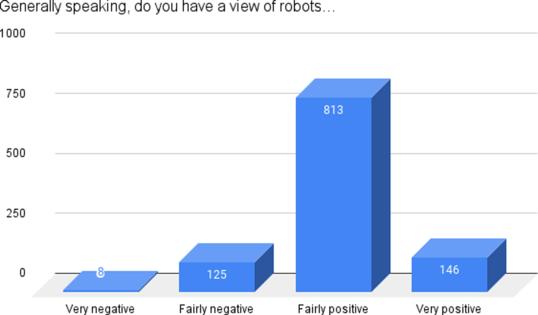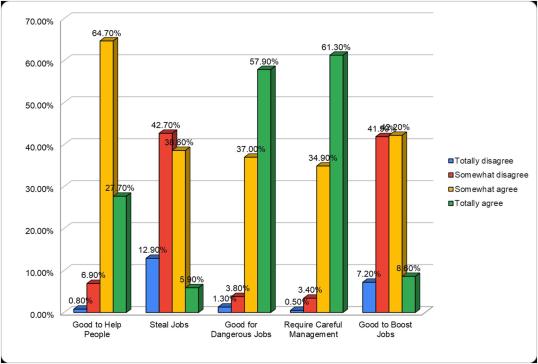The paper is the result of the visiting period of Dr. Laura Aymerich-Franch at the JRC HUMAINT lab. During her stay, she worked with Emilia Gomez, Lead Scientist at the JRC Algorithmic Transparency team, to design a large-scale survey of around 1000 EU citizens. Participants were asked about their opinion of the adoption of robots in healthcare in 26 different functions (including companionship, monitoring, medication, triage, support to diagnosis or psychological support), and their opinion on the threat to trustworthy social robots, considering the seven requirements for trustworthy AI (human autonomy, privacy, safety, fairness, diversity, and non-discrimination, societal well-being, and accountability).
The study also analyses the relationship between participant opinions on the use of social robots and the perceived vulnerability of care recipients, the degree of responsibility given to the robot, and their personal characteristics such as gender, country, religious belief, age or previous experience with robots. You can access the full paper here, but some of the key findings are highlighted below.
Most participants had a fairly positive view of robots
Particularly when performing functions that are too hard or dangerous for people:
Participants perceived some robot functions more threatening than others
The uses that were seen to entail the highest levels of threat were 1) triaging, i.e. using social robots to measure vital signs to provide pre-diagnoses or prioritize patients according to the urgency of their symptoms, and 2) banning entrance to a building to people that present a threat to public health (e.g., have a fever) or do not comply with the rules (e.g., mandatory face mask).
Other functions such as providing touch interaction for emotional support or collecting personal information of medical symptoms also obtained a negative evaluation, with a concern for privacy highlighted.
The level of responsibility in a role was also a factor in acceptance, e.g. assisting a nurse, doctor, was better accepted than replacing them.
Some groups are more positive about the use of social robots
In terms of personal characteristics, the study found that males, on average, expressed more positive views of social robots, compared to females, and that older adults showed slightly more concern than younger ones. Experience and familiarity with robots were also correlated to acceptance.
The findings indicate the potential of using robots in healthcare, in terms of societal acceptance within the EU. It needs to be done in functions that make citizens comfortable, ensuring privacy is preserved. There seems to be an inclination towards human autonomy and oversight in roles involving critical judgment, empathy, and ethical considerations. Lastly, it is important to consider demographic variables, and make citizens more aware and familiar with this state of the art technology.
Details
- Publication date
- 8 August 2024
- Author
- Joint Research Centre


